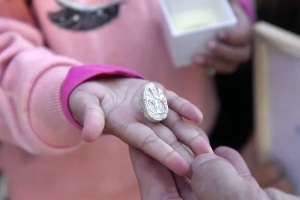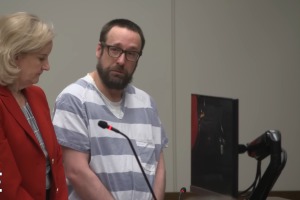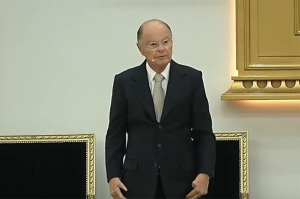Christians Speak Out on Iraqi Archbishop's Death
The death of a high-ranking Chaldean Catholic archbishop in Iraq has provoked outcry from the Christian community over the increased violent acts directed at Iraq's tiny and rapidly shrinking Christian community.
Christian leaders as well as political leaders worldwide have condemned the kidnapping and death of Archbishop Paulos Faraj Rahho, who was buried Friday outside of Mosul in northern Iraq. The 65 year-old priest was the second most senior Catholic cleric in Iraq.
It is still unknown if the archbishop was killed or if he died of illness while held hostage, according to The Associated Press. A Mosul morgue official, speaking on condition of anonymity for security reasons, said there were no bullet holes in Rahho's body.
"This is a sad day for the Chaldean/Assyrian/Syriacs of Iraq and for the entire world of Christianity," said Jackie Bejan, the executive director of Chaldean Assyrian Syriac Council of America (CASCA), according to Assyrian International News Agency. "May God help and protect the defenseless people of Iraq."
CASCA condemned the alleged "murder" of the Archbishop and urged Secretary of State Condoleezza Rice to appeal to the Iraqi government and increase U.S. efforts to protect the remaining Iraqi Christian population.
Likewise, other Christian groups and figures have expressed sadness and denounced Rahho's kidnapping and death including the World Evangelical Religious Liberty Commission, Christian Solidarity International, Open Doors, Archbishop of Canterbury Dr. Rowan Williams of the Anglican Communion, the National Council of Churches USA (NCCUSA), and the Middle East Council of Churches.
"The MECC condemns this terrorist killing and calls on the Iraqi Government to open an immediate investigation into this sad event and find out the complete truth," read a statement signed by MECC general secretary Gurigis Ibrahim Saleh.
Violence directed at Iraqi Christians has steadily risen, especially in recent months, forcing hundreds of thousands to flee the country. It is estimated that Christians make up nearly half of all refugees leaving the country, although they make up less than three percent of the country's population. In total, nearly 2.2 million Iraqis have left the country since the U.S.-led offensive in 2003.
Now, there are only about 600,000 Iraqi Christians remaining in the country, down from 1.2 million before 2003.
Many human rights experts have warned that if there is no intervention, the Iraqi Christian population could become extinct through emigration and persecution.
Over the past four years, many Iraqi Christian leaders have been murdered, including Fr. Paulos Iskander who was beheaded; Fr. Mundhir al-Dayr who was assassinated in his Protestant church; and Fr. Ragheed Ganni and three deacons who were gunned down and their cars, bombed, according to Nina Shea, director of the Center for Religious Freedom at the Hudson Institute, in the National Review.
Sunni militants from a mosque in Baghdad's Dora neighborhood issued a fatwa last summer that demanded 2,000 Christian families living in the area to convert or be killed.
Then earlier this year, 10 Iraqi churches were bombed within a span of two weeks. Although no one was killed in the attacks, they caused serious damage to many of the church buildings.
"The Chaldean Christians, some of the last remaining speakers of Aramaic, the language of Jesus, are suffering under the persecution of Jihadis that seek to drive them from their ancestral homes and create a pure Islamic caliphate erased of the memory of Iraqi Christians," declared Faith McDonnell, director of Religious Liberty Programs at the Institute on Religion & Democracy.
She called on American Christians to stand up for the church in Iraq, reminding them that the United States has already made "great sacrifice" to bring freedom and democracy to the people of Iraq.
"The United States government must acknowledge that defenseless Iraqi Christians are particularly singled out in this jihad, and must be protected," she emphasized.
Iraqi Christian activists in the United States have urged the U.S. government to support the idea of creating an autonomous zone in northern Iraq called the Nineveh Plains Administrative Unit.
The Nineveh Plains, which is the ancestral homeland of Assyrian Christians, would act as a state where Assyrians and Christians can practice their faith, speak and teach their language, and work without fear of persecution. Persecution in cities has already driven thousands of Christians to resettle and take refuge in this northern area.
Nina Shea, who is also a commissioner on the U.S. Commission on International Religious Freedom, criticized the Bush administration for not acknowledging that Christians and other "defenseless minorities" are persecuted for their faith.
"No policies exist to address their (Christians and minorities) specific needs in Iraq or facilitate their finding refuge abroad," Shea recently wrote in the National Review. "No programs exist to train and support them to police their own villages – more critical than ever now that the military surge has flushed terror northward.
"No checks are in place to ensure that their villages in Nineveh and elsewhere in the north share equitably in U.S. largesse," Shea wrote. "No senior administration official has ever even met to hear the views of their American leaders as a group and forge solutions."
Shea supports the creation of a Nineveh Plains for Iraqi Christians.
"Our Iraqi sisters and brothers in Christ live each day under the threat of violence and death," the Rev. Dr. Michael Kinnamon, general secretary of the National Council of Churches USA, said. "All Christians and persons of faith pray for their safety, even as we remind the Iraq government of its urgent responsibility to protect all Iraqis."





























